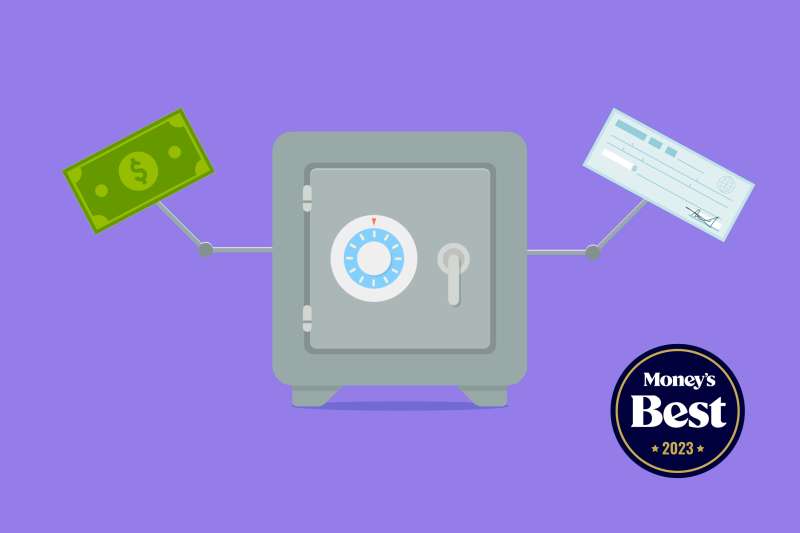5 Best Money Market Accounts

Money Market accounts are deposit accounts that earn you interest on your balance. These give you the benefits of both checking and savings accounts because your money not only remains liquid but also generates returns.
There may be some restrictions on withdrawals depending on your financial institution, but money market accounts generally pay a higher annual percentage yield than savings accounts.
Money market deposit accounts are also considered low-risk because the federal government insures them up to $250,000 through the Federal Deposit Insurance Corporation (FDIC) or the National Credit Union Administration (NCUA).
Best Money Market Accounts of 2021
| Bank/Institution | APY | Features | Learn More |
| CIT Bank: Best for Easy Transfers | CIT Bank Money Market Account, 0.50% | • Monthly fees: $0 • Minimum balance: $100 | Read Full Review |
| NBKC Bank: Best for Large ATM Network | NBKC Bank Personal Money Market, 0.40% | • Monthly fees: $0 • Minimum balance: $0.01 | Read Full Review |
| Ally Bank: Best for Quality Customer Experience | Ally Bank Money Market Account, 0.50% | • Monthly fees: $0 • Minimum balance: $0 | Read Full Review |
| Axos Bank: Best for High APY | Axos Bank High Yield Money Market Account, 0.60% | • Monthly fees: $0 • Minimum balance: $1,000 (opening) | Read Full Review |
| Synchrony Bank: Best for Accessible Cash | Synchrony Bank Money Market Account, 0.40% | • Monthly fees: $0 • Minimum balance: $0 | Read Full Review |
Best Money Market Account Reviews
CIT Bank Money Market Account
Best for Easy Transfers
If easy transfers are a strong selling point for you, the CIT Bank Money Market Account has some noteworthy features. By integrating your Zelle and PayPal accounts, you’ll be able to carry out transfers with ease for anything from paying bills to online shopping.
The bank’s mobile app also offers a Bill Pay feature to schedule payments. All wire transfers can be carried out by phone, and ACH electronic transfers are capped at a whopping $2 million per day.
With money market accounts, you can keep your money liquid while generating returns. The CIT Bank Money Market Account has various options for performing transfers that emphasize the very liquidity these accounts provide. If your finances require regular transfers, this low-fee account may suit your needs.
Pros:
- Zero monthly fees
- $100 minimum opening deposit
- Various methods for transferring money
Cons:
- No ATM card
- No check-writing privileges
- $25 overdraft fee
Other Relevant Details
With the CIT Bank Money Market Account, you’ll earn interest on your money, no matter the balance. After you open your account with a $100 initial deposit, you are not required to have a minimum monthly balance.
The account has the usual limit of six transactions per month, as per Regulation D federal law. If you exceed this amount, you’ll be charged a $10 excess withdrawal fee.
NBKC Bank Money Market Account
Best for Large ATM Network
If you’re looking for easy access to cash, NBKC Bank's Personal Money Market account gives you access to an ATM network of over 32,000 tellers.
This network is available across the United States and Puerto Rico. All of its tellers are surcharge-free and, should you ever have to use an out-of-network machine, NBKC reimburses up to $12 a month for incurred ATM fees.
Pros:
- No minimum deposit requirement
- Hardly any fees
- Large ATM network
- $12 reimbursement of fees from out-of-network ATMs
- Complimentary checks
- Mobile banking
Cons:
- Limited to six debit card transactions per month (Regulation D)
- At 0.40%, the APY is on the low side
- No 24/7 customer support
Other Relevant Details
Interest on this money market account is compounded daily. All earned returns are credited to your balance each month.
Other methods of deposit include mobile check deposit, online transfer, and direct deposits.
Furthermore, NBKC does not charge any fees for overdrafts, and eStatements are included at no extra cost.
Lastly, while NBKC is an online bank, they have a handful of branches in the Kansas City area.
Ally Bank Money Market Account
Best for Customer Experience
For those seeking a modern online bank that provides the same level of support as more traditional institutions, Ally Bank has something to offer.
Ally has gained a reputation for being an online bank that’s available to customers around the clock. If you require assistance, bank representatives are available 24/7 via phone, email, and live chat.
Furthermore, to offset some of the frustrations that come with being placed on hold, Ally Bank lets you know how much time you’ll have to wait — even before you reach out. This feature is available via browser and mobile app.
The bank also has a chatbot with voice interaction designed to answer your questions. This tech was first introduced in 2015, paving the way for other artificial intelligence banking assistants developed since.
Pros:
- Zero monthly maintenance fees
- No minimum deposit or balance requirements
- No fees for transferring to and from other financial institutions
Cons:
- No physical branches
- $10 excessive transaction fee
- $25 overdraft fee
Other Relevant Details
Ally Bank can send you personalized alerts via email or text to inform you of any changes to your account, such as deposits, overdrafts, or balance information.
Axos Bank Money Market Account
Best for High APY
These days, rates for all interest-bearing accounts are considerably low. Money market account rates are not the exception.
If you’re looking to get the most returns from your money market account, Axos Bank has an APY of 0.60%, a high-interest rate by current standards. It’s worth noting that this rate does not increase with higher balances.
While you need a $1,000 deposit to open this money market account, there are no monthly service fees. This account also includes checks, an added convenience for quick payments.
Pros:
- Mobile check deposit
- Physical branches in 3 states
- Zero monthly service fees
- Complimentary debit card
Cons:
- $1,000 minimum opening balance
- No fee reimbursement for out-of-network ATMs
- $25 overdraft fee
Other Relevant Details
Axos Bank has a mobile banking app offering real-time updates regarding your account activity. These updates can also be received via text message or email.
Should you need assistance during off-hours, Axos has a chatbot that answers your questions and provides banking information 24 hours a day.
Synchrony Bank Money Market Account
Best for Accessible Cash
With Synchrony Bank’s money market account, you can save money and earn a return, all while having easy access to your funds. This account provides access to your cash in various ways.
For starters, upon opening your account, you’ll receive checks and an ATM card. You can use this card at any ATM with Accel or Plus logos, widely available across the United States.
Electronic transfers are permitted to and from Synchrony accounts, as well as from other financial institutions.
Wire transfers and direct deposits can also be set up to ensure seamless access to your funds.
Pros:
- Zero monthly fees
- Zero minimum balance requirements
- Optional ATM card available
- Mobile app for all banking needs, including check deposits
Cons:
- Only reimburses $5 for out-of-network ATMs in the United States.
- If your balance remains at $0 for longer than 60 days, your account may be closed.
- Only one physical branch, located in New Jersey.
Other Relevant Details
Similar to other accounts, the Synchrony Bank money market account has a limit of six monthly transactions. Failure to comply can result in your account being closed. That said, this limit is currently being waived in light of the ongoing health crisis.
Pros & Cons of Money Market Accounts
On the surface, it’s clear that money market accounts offer perks that could benefit anyone.
“I think the biggest benefit is a level of confidence in the ability to get access to your cash when you need it,” says Mac Gardner, CFP. “There's very little volatility in money market accounts,” he added.
Regardless, there are some potential shortcomings worth considering. With that in mind, we’ve put together a list of pros and cons to help you properly manage your money and your expectations.
Note: The following may not apply to all money market accounts. For details regarding our featured accounts, please see our reviews above.
| PROS | CONS |
| • Higher interest rates when compared to savings accounts. | • Withdrawals may be limited to six per month. Exceeding this amount may incur a fee. |
| • Your deposits remain accessible through ATMs, checks, and/or transfers. | • Minimum balance requirements. |
| • Little to no risk involved thanks to being insured by government agencies (FDIC and NCUA) for up to $250,000. | • Some maintenance fees may only be waived with high balances. |
How Money Market Accounts Compare to Other Bank Products
Money Market Accounts vs. Savings Accounts
Money market accounts are similar to savings accounts because they are both interest-bearing.
The main difference is that money market accounts can earn you a higher rate, but that comes with minimum balance requirements that may be higher than those associated with savings accounts.
On the flip side, money market accounts make it easier for you to access your funds, whether that’s through checks, debit cards, or transfers.
Savings accounts make it somewhat harder for you to access your money as a way of pushing you to be an efficient saver.
If you meet your financial institution’s minimum balance requirements with money market accounts, you may get better returns than with a standard type of savings account. In some cases, certain fees may be waived as well.
For more competitive rates, you can always look into high-yield savings accounts.
Money Market Accounts vs. Money Market Funds
While they sound similar, money market accounts and money market mutual funds are two entirely different things. They both bear some relationship to the money market and its short-term investments.
Essentially, they are both money market instruments, but that’s where the similarities end.
“A fund company owns a money market fund; a bank owns a money market account,” says Gardner. “Part of the benefit of being owned by that bank is you have FDIC insurance.”
Money market accounts are a type of interest-bearing deposit account associated with a financial institution. How much interest you earn with a money market account depends entirely on a variable interest rate.
A money market fund is a type of mutual fund that usually consists of debt securities. Like a mutual fund, a money market fund holds a basket of assets that generate investors' returns.
Money market funds are generally considered lower-risk compared to the stock market.
To reiterate, money market accounts represent deposits in financial institutions, and money market funds represent investments.
While they’re both rooted in the money market, their means of generating returns are considerably different.
Money Market Accounts vs. Certificates of Deposit
Saving money is a smart move. If you can put money aside and have it earn some interest to offset inflation, you’re doing something right.
When it comes to what bank products can help you in these efforts, both money market accounts and certificates of deposit (CDs) offer different methods for helping you save.
First off, money market accounts and certificates of deposit are set up differently. There may not be much difference in terms of the interest they offer, but the fact remains that money market accounts are far more accessible than CDs.
If you want or need to withdraw money from your money market account, it’s as simple as using a debit card or writing a check.
CDs, however, are term deposits. This means you have to wait for a term to end before you can access your fund. Doing so before will be met with a fee.
On the other hand, certificates of deposit offer fixed rates, guaranteeing that you will earn a certain amount of interest during the term. With money market accounts, the rates are variables and can change at any moment.
This could be appealing to some, but access to your money is more difficult in CDs than money market accounts.
“Let's say you put $50k into a one-year CD for a higher yield. If you break that CD, you have to pay the penalty,” says Gardner. “That's a big difference. MMAs are on-demand, and you can access them whenever. The trade-off is [a lower] return because the bank is not going to hold your money for as long as they would with a CD.”
Which of these two products suits you best depends entirely on your particular financial needs.
FAQs About Money Market Accounts
How does a money market account work?
Money market accounts are interest-bearing deposit accounts, meaning you will earn interest on your balance.
While they may be similar to savings accounts, money market accounts typically have better interest rates, and your balance remains more accessible through checks, debit cards, ATM withdrawals, and transfers.
The federal government insures all money market accounts for up to $250,000.
How to choose a money market account?
To get the most out of your money market account, it’s important to look for high rates and low monthly fees. What’s better than low monthly fees? Zero monthly fees.
While money market accounts offer various benefits, like keeping your money liquid and insured, keeping a close eye on the rates and fees will help you make sure you’re not losing money in the process.
Can you lose your money in a money market account?
The short answer is no. The federal government insures money market accounts for up to $250,000. If your account is at a bank, it is insured by the FDIC (Federal Deposit Insurance Corporation).
Accounts at credit unions are insured by the NCUA (National Credit Union Association). In essence, you need not worry if your financial institution goes out of business — your money is insured.
Are money market rates fixed?
Money market rates are not fixed; they are variable. As such, they can change at any time depending on a wide range of factors.
Everything from the Federal Reserve's policies to banks’ desire to remain competitive can affect money market rates.
Are there any risks to having a money market account?
Unless the balance in your account exceeds the $250,000 insured by federal agencies, there’s little to no risk involved in having a money market account.
“The major risk with owning money market accounts is inflation and purchasing power,” says Gardner. “If inflation is chugging along at 3%, and your money market account is only earning you 1%, you're actually losing money every year when it comes to funding a goal.”
Is a money market account safe?
Yes, money market accounts are safe. Apart from being FDIC-insured, banks and other financial institutions invest funds from money market accounts in considerably-safe and short-term securities. This practice keeps the money liquid and reduces any potential risk.
“The FDIC was created as a layer of protection of $250,000 per individually named account,” says Gardner. “But there's risk associated with every type of financial vehicle. If you're looking for someplace to put your money and feel confident that it'll be there tomorrow — even if the bank goes under — that's what the FDIC insurance is there for.”
How to open a money market account?
Opening a money market account is as simple as visiting a bank branch or clicking over to the corresponding website.
It’s customary for the financial institution to request personal information such as date of birth, Social Security number, among others.
Also, some banks and/or credit unions require customers to make a minimum deposit to open a money market account.
How does a money market account compare to a checking account?
Just like checking accounts, some MMAs offer easy access to your money through checks.
Unlike checking accounts, however, MMAs generate interest but are limited to six transactions per statement cycle.
These bank accounts are better suited for you depending on the types of withdrawals you intend to carry out.
For nearly-daily withdrawals, a checking account is best. For more restrained withdrawals, an MMA may suit you.
Methodology
To put together our list of the 5 Best Money Market Accounts of 2021, we looked into a wide variety of financial institutions, ranging from national banks and credit unions to regional and online banks.
For these companies to meet our requirements, they must offer valuable features, solid online and/or physical infrastructure, along with competitive interest rates according to current market conditions.
These companies were also rated based on their APY, minimum balance requirements, monthly fees, support resources available, and overall customer experience.
Summed Up List of the Best Money Market Accounts
- CIT Bank: Best for Easy Transfers, 0.50% APY
- NBKC Bank: Best for Large ATM Network, 0.40% APY
- Ally Bank: Best for Quality Customer Experience, 0.50% APY
- Axos Bank: Best for High APY, 0.60% APY
- Synchrony Bank: Best for Accessible Cash, 0.40% APY

